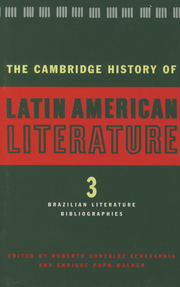Book contents
- Frontmatter
- Introduction to Volume 3
- 1 The literary historiography of Brazil
- 2 Colonial Brazilian literature
- 3 Brazilian poetry from the 1830s to the 1880s
- 4 Brazilian poetry from 1878 to 1902
- 5 The Brazilian theatre up to 1900
- 6 Brazilian fiction from 1800 to 1855
- 7 The Brazilian novel from 1850 to 1900
- 8 Brazilian fiction from 1900 to 1945
- 9 Brazilian prose from 1940 to 1980
- 10 The Brazilian short story
- 11 Brazilian poetry from 1900 to 1922
- 12 Brazilian poetry from Modernism to the 1990s
- 13 The Brazilian theatre in the twentieth century
- 14 Brazilian popular literature (the literatura de cordel)
- 15 Literary criticism in Brazil
- 16 The essay: architects of Brazilian national identity
- 17 The Brazilian and the Spanish American literary traditions: a contrastive view
- Bibliography
- Index
- References
3 - Brazilian poetry from the 1830s to the 1880s
Published online by Cambridge University Press: 28 March 2008
- Frontmatter
- Introduction to Volume 3
- 1 The literary historiography of Brazil
- 2 Colonial Brazilian literature
- 3 Brazilian poetry from the 1830s to the 1880s
- 4 Brazilian poetry from 1878 to 1902
- 5 The Brazilian theatre up to 1900
- 6 Brazilian fiction from 1800 to 1855
- 7 The Brazilian novel from 1850 to 1900
- 8 Brazilian fiction from 1900 to 1945
- 9 Brazilian prose from 1940 to 1980
- 10 The Brazilian short story
- 11 Brazilian poetry from 1900 to 1922
- 12 Brazilian poetry from Modernism to the 1990s
- 13 The Brazilian theatre in the twentieth century
- 14 Brazilian popular literature (the literatura de cordel)
- 15 Literary criticism in Brazil
- 16 The essay: architects of Brazilian national identity
- 17 The Brazilian and the Spanish American literary traditions: a contrastive view
- Bibliography
- Index
- References
Summary
Brazilian poetry of the nineteenth century was strongly influenced by political tensions. From this period forward, the relationship between literature and social values in Brazil would become very intimate. The first political event of consequence to provoke a reaction in the literary arena was the transference of the Portuguese court to Brazil in the years between 1808 and 1820. This resulted in the development of a metropolis–colony and colony–metropolis relationship that was subject to waves of internationalism and to a strong patriotic reaction on the part of the Brazilians.
In 1822, Brazil gained its political independence. This event fed the nativist tendencies of the poets, who took advantage of the circulation of romantic ideas in order to expand their discourse.
The Portuguese upper class, with opportunistic motives in mind, allied itself politically with the aristocratic nobility, the clergy, and the bourgeoisie exporting goods from Brazil. These groups shared a conservative view of the world and showed themselves to be directly or indirectly linked to the latifundia system of exploitation.
However, the lower-middle and middle classes, in alliance with bureaucratic groups, were receptive to the ideas of liberalism, where aspirations of liberty and equality favored the strengthening of the individual’s conscience. Nevertheless, this attitude soon experienced moments of disenchantment that would be expressed in the phase of the romantic “spleen.” The lack of initiative on the part of the bourgeoisie initially lent itself to a diffuse sense of religion, in which devout Catholicism and a belief in Divine Providence prevailed. All of this combined with a certain sentimental Humanism.
- Type
- Chapter
- Information
- The Cambridge History of Latin American Literature , pp. 69 - 82Publisher: Cambridge University PressPrint publication year: 1996



